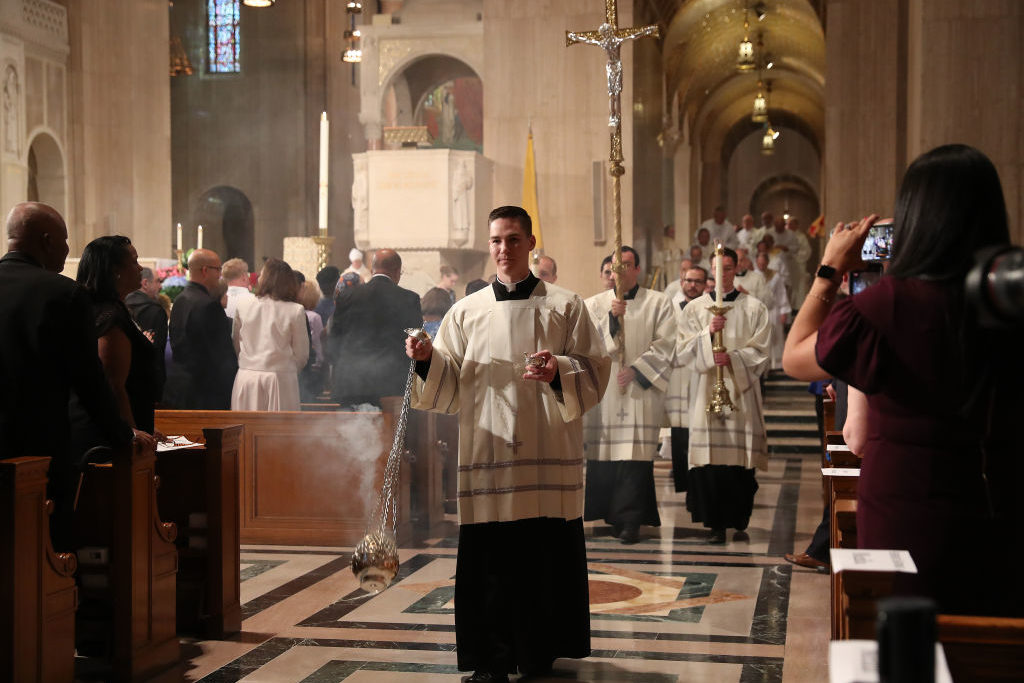The new Pew report doesn’t mince words in its headline: ‘In US, Decline of Christianity Continues at Rapid Pace.’ In 10 years, the percentage of Americans who identify as Christians of any kind has declined by 12 percent. In 2009, just over 50 percent of Americans identified as Protestant; today only 43 percent do. Catholics have declined from 23 percent to 20 percent of the adult population. The biggest declines in Christian identification by demographic group have been among millennials (down 17 points) and Democrats (down 16 points). But dwindling Christian commitments are in evidence across all categories: ‘white people, black people and Hispanics; men and women; in all regions of the country; and among college graduates and those with lower levels of educational attainment.’The Hispanic data are particularly interesting. Among Catholic intellectuals of the right there is a certain enthusiasm for Latin American immigration, in the belief that this will bolster the Church in America. Yet Pew finds that ‘Catholics no longer constitute a majority of the US Hispanic population. In Pew Research Center RDD surveys conducted in 2018 and 2019, 47 percent of Hispanics describe themselves as Catholic, down from 57 percent a decade ago.’ One might think that Hispanic immigration offsets what might otherwise be even steeper declines in American Catholic numbers. But it’s hard not to reach the conclusion that America at present does more to dissolve the faith of its Catholic immigrants than they do to reinforce Catholicism in America.While it’s striking that a majority of US Hispanics is now non-Catholic, even more remarkable is the fact that white Democrats are, for the most part, not Christians at all. ‘Today fewer than half of white Democrats describe themselves as Christians, and just three-in-ten say they regularly attend religious services,’ Pew reports. ‘More than four-in-ten white Democrats are religious “nones,” and fully seven-in-ten white Democrats say they attend religious services no more than a few times a year.’ That the party that politically benefits the most from large-scale immigration is also an increasingly irreligious party is another reason not to think that Americans’ faith will be restored by the importation of believers from abroad. Republican consultants have long argued that religion will bring new immigrants over to the GOP. But instead of immigrant religion undermining Democratic politics, it may be that Democratic politics is undermining immigrant religion.In some circles it is conventional wisdom that the union of evangelical Christianity with the Republican party has produced a backlash against Christianity, both in the Democratic party in particular and in the culture more widely. If the image of Christianity in America is a Pat Robertson or the late Jerry Falwell, the theory goes, then anyone who is to the left of Robertson or Falwell might be turned off of Christianity. But this explanation begs the obvious question: why did right-wing figures like Falwell and Robertson become the face of Christianity in politics beginning in the 1980s, rather than the successors to Rev. Martin Luther King or William Sloane Coffin? American Protestantism had a long history of leading left-wing social movements in America. But the left-wing social movements of the last 30 years have not been led by Protestant religious figures to the same extent. Why are the right-wing Protestants so much more important in politics?The answer lies in the nature of the social movements of the last three decades. There are self-identified Christians who support the sexual liberation movements of the post-Civil Rights era, from abortion to same-sex marriage to the new transsexual ideology, but Christian tradition does not lend itself easily to any of those causes — certainly not as easily as secular viewpoints can do so. Christian liberalism is simply unnecessary: liberalism gains nothing ideologically from the association with Christianity, and it risks stumbling into confusion when set against historical Christianity beliefs. The new god-concepts of autonomy and rights replace any need on the left for Christianity. This is sometimes not true at the ballot box, of course, but even in those places where voters still cling to Christianity, liberal power exercised through education, the media, and immigration policy will bring about change quickly enough. The children of American Christians will learn liberalism and autonomy from their teachers and from the media they’re taught to respect, and young Americans in general will come more and more from populations without roots in American Christianity or politics and whose roots in their own lands’ traditions have been torn out. The Pew report shows the results: Democrats and the young are becoming less Christian most rapidly, in what may now be a feedback loop.(On the subject of the media young people are taught to respect: on Twitter there were complaints recently about a chart showing various media companies arranged from left to right, which a library was using to teach children about which sources to trust—the lesson being that they should exclude the far-left and far-right. Most of the Twitter complaints were about the placement of media on the continuum rather than about why a library, of all things, was in the business of teaching children to disregard certain sources of information.)Republicans have done their own part to undercut Christianity in America, not least through transmuting faith into political universalism, by way of such right-wing variations on liberalism as the ‘freedom agenda’ in the Middle East (so lethal for the region’s Christians) and the prioritizing of economic abstractions over the needs of concrete communities. A consumer culture doesn’t require Christianity any more than a sexually transgressive one does. But Republican elites continue to depend on Christian voters, who — along with their nationalist allies — can pressure the GOP into resisting some of the more socially revolutionary tendencies of the Democratic party. In America as in so many other places around the globe today, from Eastern Europe to Israel to India, the divide in politics is increasingly between secular liberalism on the one hand and a coalition of faith and nation on the other. Economics is no longer the axis that orients parties. In this emerging environment, the Republican party has a choice to make, and the Democrats have already made theirs.
That the party that politically benefits the most from large-scale immigration is also an increasingly irreligious party is another reason not to think that Americans’ faith will be restored by the importation of believers from abroad. Republican consultants have long argued that religion will bring new immigrants over to the GOP. But instead of immigrant religion undermining Democratic politics, it may be that Democratic politics is undermining immigrant religion.In some circles it is conventional wisdom that the union of evangelical Christianity with the Republican party has produced a backlash against Christianity, both in the Democratic party in particular and in the culture more widely. If the image of Christianity in America is a Pat Robertson or the late Jerry Falwell, the theory goes, then anyone who is to the left of Robertson or Falwell might be turned off of Christianity. But this explanation begs the obvious question: why did right-wing figures like Falwell and Robertson become the face of Christianity in politics beginning in the 1980s, rather than the successors to Rev. Martin Luther King or William Sloane Coffin? American Protestantism had a long history of leading left-wing social movements in America. But the left-wing social movements of the last 30 years have not been led by Protestant religious figures to the same extent. Why are the right-wing Protestants so much more important in politics?The answer lies in the nature of the social movements of the last three decades. There are self-identified Christians who support the sexual liberation movements of the post-Civil Rights era, from abortion to same-sex marriage to the new transsexual ideology, but Christian tradition does not lend itself easily to any of those causes — certainly not as easily as secular viewpoints can do so. Christian liberalism is simply unnecessary: liberalism gains nothing ideologically from the association with Christianity, and it risks stumbling into confusion when set against historical Christianity beliefs. The new god-concepts of autonomy and rights replace any need on the left for Christianity. This is sometimes not true at the ballot box, of course, but even in those places where voters still cling to Christianity, liberal power exercised through education, the media, and immigration policy will bring about change quickly enough. The children of American Christians will learn liberalism and autonomy from their teachers and from the media they’re taught to respect, and young Americans in general will come more and more from populations without roots in American Christianity or politics and whose roots in their own lands’ traditions have been torn out. The Pew report shows the results: Democrats and the young are becoming less Christian most rapidly, in what may now be a feedback loop.(On the subject of the media young people are taught to respect: on Twitter there were complaints recently about a chart showing various media companies arranged from left to right, which a library was using to teach children about which sources to trust—the lesson being that they should exclude the far-left and far-right. Most of the Twitter complaints were about the placement of media on the continuum rather than about why a library, of all things, was in the business of teaching children to disregard certain sources of information.)Republicans have done their own part to undercut Christianity in America, not least through transmuting faith into political universalism, by way of such right-wing variations on liberalism as the ‘freedom agenda’ in the Middle East (so lethal for the region’s Christians) and the prioritizing of economic abstractions over the needs of concrete communities. A consumer culture doesn’t require Christianity any more than a sexually transgressive one does. But Republican elites continue to depend on Christian voters, who — along with their nationalist allies — can pressure the GOP into resisting some of the more socially revolutionary tendencies of the Democratic party. In America as in so many other places around the globe today, from Eastern Europe to Israel to India, the divide in politics is increasingly between secular liberalism on the one hand and a coalition of faith and nation on the other. Economics is no longer the axis that orients parties. In this emerging environment, the Republican party has a choice to make, and the Democrats have already made theirs.
The Democratic party’s post-Christian America
The divide in politics is increasingly between secular liberalism on the one hand and a coalition of faith and nation on the other

Members of the Catholic church participate in the installation mass for new Archbishop of Washington, Wilton D. Gregory
The new Pew report doesn’t mince words in its headline: ‘In US, Decline of Christianity Continues at Rapid Pace.’ In 10 years, the percentage of Americans who identify as Christians of any kind has declined by 12 percent. In 2009, just over 50 percent of Americans identified as Protestant; today only 43 percent do. Catholics have declined from 23 percent to 20 percent of the adult population. The biggest declines in Christian identification by demographic group have been among millennials (down 17 points) and Democrats (down 16 points). But dwindling Christian commitments are in evidence…

















